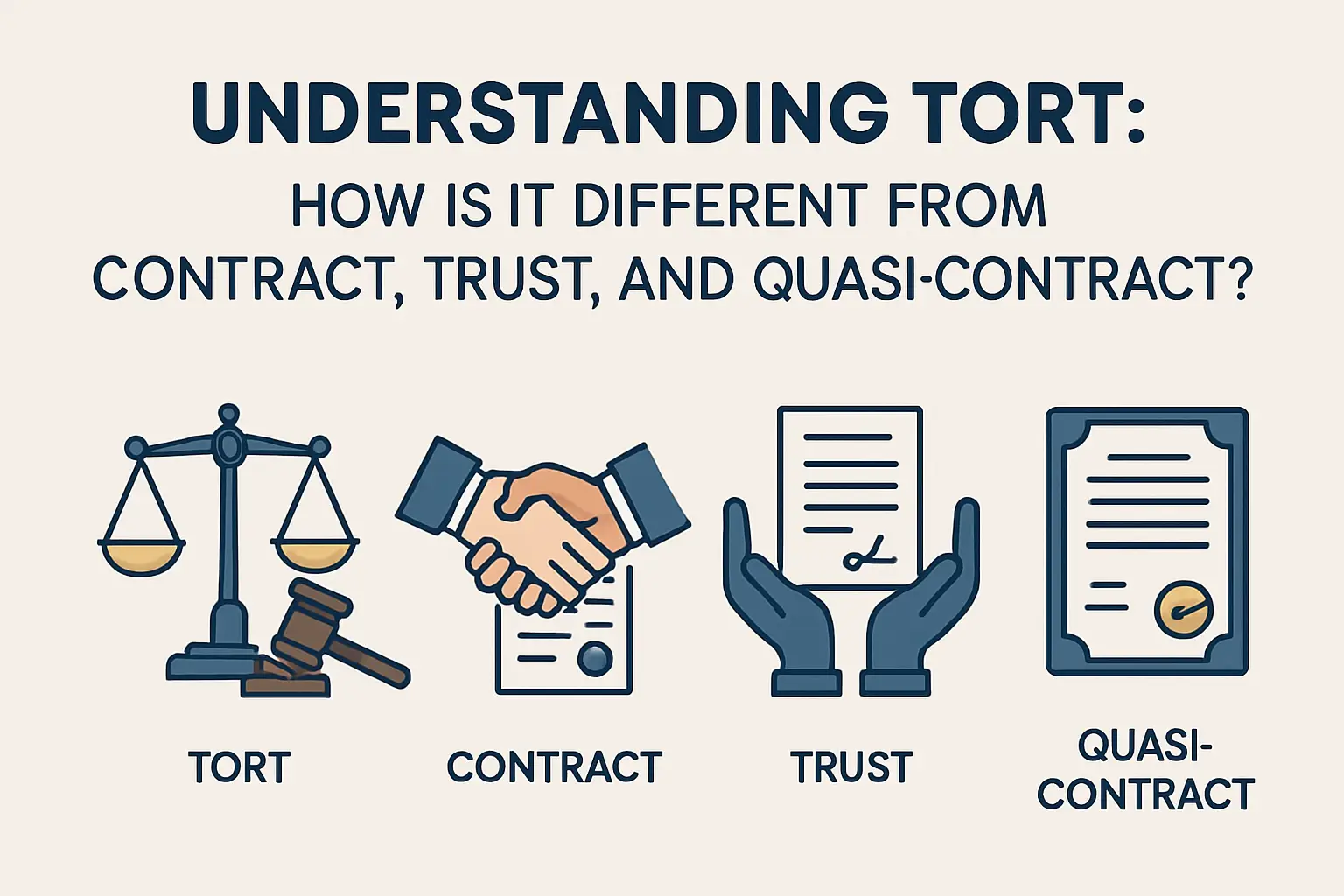The phrase “This civil wrong is other than a mere breach of contract or breach of trust” often comes up in law books, but what does it really mean? It gets to the heart of what makes a tort unique among other civil wrongs. Let’s break down how tort law is defined by what it is—and what it isn’t.
Tort vs. Breach of Contract
While both torts and breaches of contract are civil wrongs, their differences are fundamental:
1. Where the Duty Comes From:
A tort is created by law. Duties exist for everyone, even if you haven’t agreed to them—like the duty not to harm others or their property. In contrast, contract duties arise from agreements made between specific parties.
2. Privity of Relationship:
Contracts only bind the parties who agree to them. If you’re not part of the contract, you usually can’t sue over its breach. Torts are different: the duty is owed to society generally, so anyone harmed can sue—even if they had no direct relationship with the wrongdoer. A classic example is the famous Donoghue v. Stevenson case, where a consumer could sue a manufacturer, even without a contract between them.
3. Nature of Rights:
Torts protect “rights in rem”—rights enforceable against the world at large. Contracts protect “rights in personam”—rights enforceable only against specific people.
4. Damages:
Damages in torts are unliquidated—the amount is decided by a judge after the harm occurs. In contract, damages might be liquidated (pre-agreed by the parties) or unliquidated.
5. Motive:
Generally, your motive for breaking a contract doesn’t matter. In torts, motives can matter—sometimes leading to higher (“aggravated” or “exemplary”) damages.
6. Overlap & Blurred Lines:
Sometimes, the same conduct is both a tort and a contract breach (for example, when a professional causes harm through their negligence). Courts increasingly recognize that duties owed in contract and tort can overlap—especially for professionals like solicitors and doctors.
7. Purpose:
Contract law is about making sure agreements are kept. Tort law is about allocating and preventing losses that arise independently of agreements.
Tort vs. Breach of Trust
Now, what about breaches of trust?
- Damages: Losses in breach of trust cases are often liquidated (fixed, as in a sum of missing money). In tort, damages are generally unliquidated.
- Background: Tort law comes from centuries-old common law. Trust law developed in separate “Courts of Chancery” and is now linked to property law.
- Nature: Trust laws mostly deal with property and fiduciary responsibilities (where one party acts for another’s benefit).
Tort vs. Quasi-Contract
What’s a quasi-contract? It sounds like a contract but isn’t—so how does it compare to tort?
- Obligation: Both are imposed by law, not agreement. But quasi-contracts are about preventing unjust enrichment (making sure people don’t unfairly benefit at another’s expense).
- Damages: Quasi-contracts tend to involve a specific, liquidated sum (like returning money paid by mistake). Tort damages are almost always unliquidated.
- Duty Owed: In quasi-contract, the duty is owed to a specific person; in tort, it can be owed to society generally.
- Primary vs. Secondary Duty: Torts have a primary duty (don’t harm others) and a secondary, remedial duty (compensate if you do). Quasi-contracts mostly involve a secondary duty to return benefits wrongly received.
- Waiver of Tort: Sometimes, an injured party can “waive the tort” and sue as if it were a quasi-contract—to recover the value of the benefit taken, instead of regular damages.
The Takeaway
While tort, contract, trust, and quasi-contract are all civil wrongs, here’s what sets a tort apart:
- Its duties are generally owed to people at large, set by law (not consent).
- Remedies are usually unliquidated damages.
- Torts stand independently from special contracts or trusts.
Understanding these differences helps clarify when you’ve got a tort—and when you don’t!

